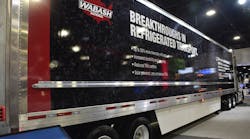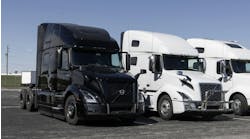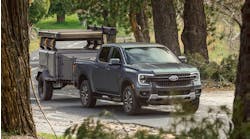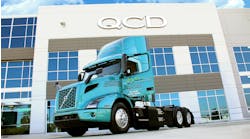Wabash National and C&S Wholesale Grocers recently showcased a zero-emissions, 48-foot refrigerated trailer featuring Wabash’s molded structural composite (MSC) technology.
“We’ve seen a lot of prototype and concept electric vehicles and trailers over the years, but no one has yet to demonstrate real viability of a roadworthy zero-emissions tractor-trailer for refrigerated hauls due to the location and size of batteries,” said Robert Lane, Wabash National’s vice president of product innovations.
“This is the first time a major box innovation has been coupled with a major TRU (transport refrigeration unit) innovation that results in breakthrough customer value in a sustainable format. MSC provides a unique platform for electric powered TRUs. The large gain in thermal efficiencies allow a customer to either downsize the batteries required to haul cargo or increase the run time on a battery setup.”
Wabash’s MSC reefer sets new standards in efficiency with optimized thermal performance, maximized payload capacity, corrosion resistance and the industry’s highest standard floor rating, Wabash said. Designed and constructed with advanced MSC technology, the MSC reefer is up to 30% more thermally efficient than a conventional refrigerated trailer, reducing fleets’ operating costs by running fewer hours, using less fuel and lasting longer.
“We’re putting units into our fleet that depend heavily on solar and battery power for the truck and TRU,” explained Chris Trajkovski, vice president of fleet maintenance and DOT safety compliance at C&S Wholesale Grocers, the largest wholesale grocery supply company in the US. “We think the additional protection that comes from the Wabash MSC insulation package will be a nice match for the TRU technology so the reefer is not running, to help us make the delivery efficiently. We expect the TRU to work less with Wabash National’s composite design.”
Added Trajkovski: “When we look at the tractor-trailer combination, the ‘box’ had not evolved prior to the MSC reefer. End consumers are influencing commercial transportation, and the next step for our progress in the industry means turning to advanced materials. We chose to work with Wabash National because they don’t settle. They are challenging us at C&S Grocers to do something different.”
Trajkovski said he expects the MSC unit’s added cube space, higher UA rating and ability to maintain consistent temperature for a longer period of time to be a winning combination for C&S when coupled with its focus on electric vehicles and TRUs.
“Wabash National is the gamechanger we are looking for,” he said. “If we don’t take this opportunity, then we will never know what we could have achieved.”




